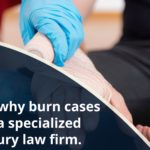Workers’ compensation is a system of insurance that benefits employees who are injured or who become ill due to their job. Benefits can include medical expenses, income replacement, and death benefits.
If you are permanently injured at work, you may be eligible for several benefits, including medical benefits, income replacement, and death benefits. Each state has its own workers’ comp laws, so it is important to check with your state’s workers’ compensation board to find out which benefits you are eligible for.
This blog will discuss which workers’ compensation benefits you may be eligible for if you are permanently injured at work.
What Counts as Permanent Workplace Injury?
There are a few things that must be met for an injury to be considered permanent:
- The injury must be serious enough to cause long-term or permanent damage.
- A qualified physician must objectify the damage.
- The impairment must be shown to be directly caused by the work environment.
If these criteria are met, the injury will be considered permanent, and the worker will be eligible for certain benefits. However, if even one of these criteria is not met, the injury will not be considered permanent.
What Are My Workers’ Compensation Benefits If I’m Permanently Injured at Work?
If you are permanently injured at work, you may be eligible for several different benefits, including medical benefits, income replacement, and death benefits. Each state has its own workers’ compensation laws, so it is important to check with your state’s workers’ compensation board to find out which benefits you are eligible for.
There are three main types of benefits that may be available to workers who are permanently injured at work: medical benefits, income replacement, and death benefits.
Medical benefits: Workers who are permanently injured at work may be eligible for medical benefits to cover the cost of treatment. This can include the cost of surgeries, hospital stays, rehabilitation, and more.
Income replacement: Workers who are permanently injured at work may also be eligible for income replacement benefits. This can include payments to help replace lost wages while the worker cannot work.
Death benefits: In some cases, workers who are permanently injured at work may also be eligible for death benefits. This can include payments to the worker’s family to help cover the funeral and burial expenses.
Additionally, you can also get Social Security Disability Insurance. SSD) is a government benefits program that provides financial assistance to people who cannot work due to a permanent disability.
If you receive workers’ compensation benefits, you may also be eligible for SSDI. To qualify for SSDI, you must have worked for a certain period and have a permanent disability that prevents you from working.
How Do I Apply for Workers’ Compensation Benefits?
If you are injured at work, you should notify your employer immediately. Your employer should then file a workers’ comp claim on your behalf. Once your claim is filed, your employer’s workers’ compensation insurance company will contact you to discuss your benefits.
You can also apply for workers’ compensation benefits by contacting your state’s workers’ comp board. You must fill out an application and submit it to the board. Once your application is approved, you will begin receiving benefits.
Applying for workers’ compensation benefits can be a complicated process, so it is important to seek the help of an experienced attorney. An attorney can help you gather the necessary evidence to support your claim and can represent you during the appeals process.
You may be entitled to several different workers’ compensation benefits if you have been permanently injured in a workplace accident. These can include medical benefits, income benefits, and death benefits. Contact an experienced workers’ compensation lawyer at 2H Law ((619) 374-9320) to find out which benefits you are eligible for.









